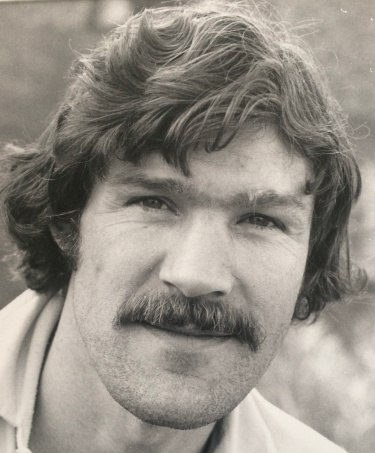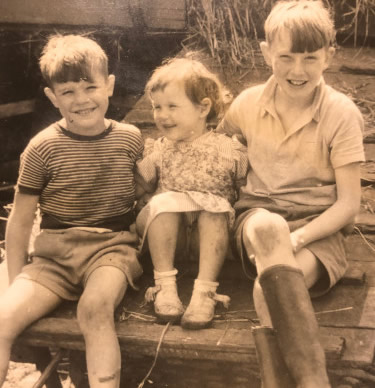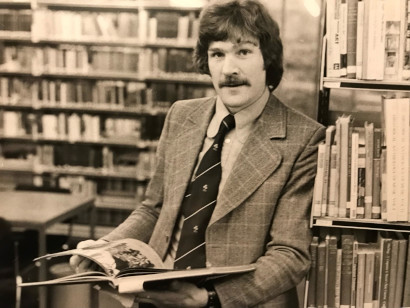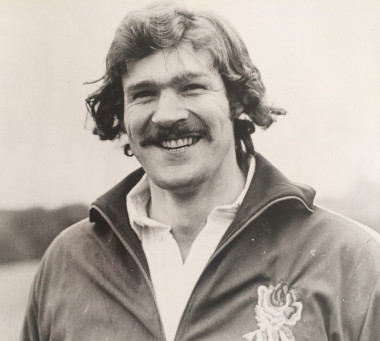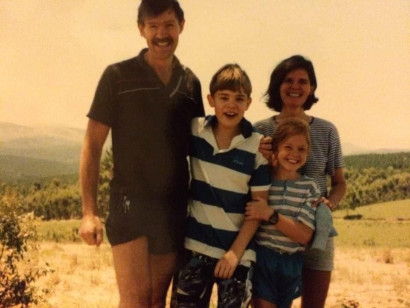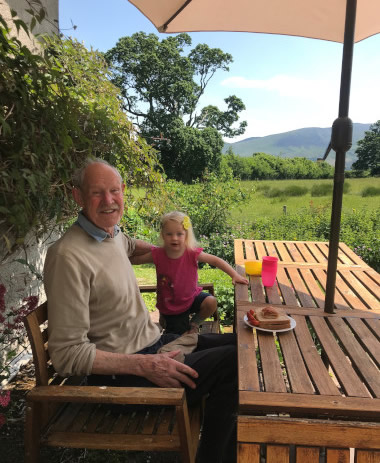|
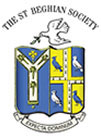 |
The Old St Beghian | |
| January 2024 | |||
Peter-John Dixon (FS 56-63) who died on August 2nd 2023.
The following is an edited version of a contribution kindly supplied by Peter’s daughter, Shelley.“Dad was born in Keighley, West Yorkshire, in April 1944. Home was Cononley, 5 km south of Skipton where his grandpa, Louis Green, and granny, ‘Queenie’, owned the mills that produced textile-related products such as bed-ticking tape. The main family house was Lingsted Hall, up on the hill, which was surrounded by fields and woodland where dad used to happily roam freely and shoot as a boy. The local churchyard of St John’s is filled with his ancestors. Two aunts and three uncles also grew up and lived in the village providing love, support and many cousins for him to play with. Two of his younger cousins told me life was idyllic for them all growing up there together and they have many fond memories of dad on the sofa with either the dog, cat, a snake or his mice. His love of animals was very obvious throughout his life. He loved his maternal grandparents dearly and they were very involved in his life until their death. The love and care provided by his wider family were particularly important as he lost his father, two-months before he was born, in the Second World War in a plane crash.
His mum, Con, despite losing three husbands over her lifetime was the most positive, happy and kind person you could meet. Ever the hostess, it sounds as though the family home was always the place to be, with friends, relatives, animals and parties galore, she was a huge influence on him, providing stability and warmth, and was an ever-present influence on his life. She had a great love of the countryside and adventure, despite her difficult circumstances, and she took the kids on many trips climbing, skiing, swimming and mountaineering all over the world. This love of adventure was instilled in dad and his siblings, Patrick (Paddy) and Heather. Paddy, also an OSB, moved to the wilderness of Canada at just seventeen years of age to join the Hudson Bay Trading Company. Dad travelled the world, having many adventures in Africa (where he also lived for a number of years), Bangladesh and Venezuela, combined with his work as an anthropologist.
Prep School was at St Helen’s in Cockermouth. Boarding from a young age, he was clearly traumatised by the morning bathing routine saying, ‘The water was very cold, especially in winter!’ It is funny to think that the local fell where I walk with my children to this day is in fact the same fell where he roamed as a boy with his school mates during his time at St Helens. His best friend back then, Clive Milburn (OSB), recalls many fond memories of these times. He also recalls that dad, already quite big for his age, was often sorting out disputes. Soon known as ‘scrapper’ Dixon, it became clear that with his size and sporting prowess (Victor Ludorum in his year) it was not worth taking him on. Despite this reputation, he was always a kind and gentle soul. I could never imagine him in a fight, but that’s what you did back then to sort a dispute and apparently later also on the rugby field! His secondary education followed at St Bees School. His house was Foundation South and he played in many of the sporting teams including gymnastics, swimming, shooting (captain), fives (captain) and of course rugby (captain). Fives was something he obviously really loved and spoke to me about on many occasions. I hear from other OSBs that at times he even played without a glove with his great big hands!
He was very content at school and was made a prefect later on. Despite his old nickname from prep school, I believe he was a helpful and well-respected leader at St Bees. Younger OSBs boys have often told me of his kindness, which wasn’t always the case in those days. These stories of his kindness continue onto the rugby pitch where many younger players have written to tell of his support when playing alongside him or even when they came up against the ‘Great Peter Dixon’ or ‘Lenny the Lion’ as he was known at Gosforth Rugby Club after the ’71 Lions tour to New Zealand. Whilst at St Bees he represented England School Boys for rugby in 1961, a good year, as his friend Martin Dawson (OSB) played for England too at golf. I hear Martin was a great cross-country runner as well, but rarely met dad on the rugby pitch as he played for the 3rds. He does, however, remember him running straight through him on one occasion during a rugby match and says his back has never been the same since!
A trip with OSBs Clive Milburn and Patrick Stobart as 15/16 year olds to Africa sounds like quite the adventure, and likely sparked the love of Africa that remained throughout his life. Despite the OSBs dispersing across the world, I was always struck at how he managed to visit them frequently if passing anywhere near. John Cade (OSB) told me of meetings with him at Johannesburg airport when he went here and there across Africa and of playing rugby together at the opening of the Loftus Versfield ground, Pretoria. I was also struck at how many OSBs dad was able to still see in Cumbria and how many reached out with messages when they knew he was ill.He moved on from St Bees to Durham University with a few school mates. He was in Grey College and immediately joined the rugby team. Already playing for Cumbria County first team at just 18, he took on the role of player-coach at the university. It sounds like he had a lot of fun at uni, but noted by his friends that he didn’t have quite as much fun as they did at times, taking his academic studies and his sport very seriously. Winner of the Palatine Plate and the Universities Athletics Union Cup with his team, he was also playing for Cumbria and Workington Rugby Football Club.
After completing his geography and anthropology degree he headed to Oxford University as a postgrad to continue his studies and rugby career. During his time at Oxford, he gained his MLitt in West African Burial rights (a weighty tome that stands in his old book case to this day), various teaching qualifications and four rugby blues. In the Varsity matches, the scores against Cambridge improved each year from a loss to a draw to a win, his team mates noting that this was due largely to his leadership, training and prowess on the pitch. Oxford also beat the Springboks at Twickenham in 1969, in a highly publicised and controversial match due to the apartheid laws in South Africa at that time. Apparently 400 policemen were needed to control the crowd. It was at one of these Oxford matches where the great Carwyn James spotted dad and invited him to join the 1971 British and Irish Lions touring team to New Zealand before he had even been picked to play for England. He did in fact just manage to play for England in the Presidents XV before he flew out to New Zealand.
After his various studies at Oxford came to an end, he eventually had to get a job, as back then, rugby was an amateur game so you didn’t get paid. Juggling a full-time job, a growing family and an international sports career is not for the faint-hearted. Dad returned to Durham, a city that he has always loved and called home for over fifty years, and became a teaching fellow at Durham University based at Collingwood College. He loved the academic life and went everywhere on his bike, satchel over shoulder and bicycle clips on legs. He was well liked by staff and students, many of whom he played rugby with or coached over the years. He moved his rugby playing to Newcastle Gosforth (following a brief stint at Harlequins) where he stayed for nine years, winning the John Player Cup in 1976 and 1977. Alongside Gosforth, he continued with his international career winning 22 caps for England, some as captain. It sounds like the England selectors changed their minds constantly during this era, their inconsistency contributing to England’s poor results at that time. Many say the pack was the best of any generation and he is still often considered to be one of the best to have played at number six from across the eras. Once his student days were finally over and he had to work, he was no longer free to go on further Lions’ tours. They were long and often clashed with busy exam periods so the university sadly would not sanction the leave. Dad was not willing to give up his job at Durham which he loved so much although this ultimately led to his having to pass on two further Lions tours that he was invited on. It was said that his refusal to go on the tours meant that he was not selected for subsequent internationals, but over time, they would pick him once again as he was considered to be one of the best back rows in the country. Mum used to say he just rubbed the selectors up the wrong way!
He loved playing for the Northern and North Western Counties (proudly returning to his Cumbrian/Yorkshire roots) with many players having become firm friends over the years, most famously beating the All Blacks at Workington in 1972 and in 1979. In fact, with these two victories against the All Blacks and the 1969 win against the Springboks with Oxford, dad is one of the few (perhaps the only one) to play in three club/regional teams which beat the powerhouses of world rugby. Given the brevity of modern rugby tours and the death of such matches against club/regional teams, it is unlikely that anyone in the foreseeable future will match his record. In 1979, he had finally had enough and retired from international rugby, sadly missing out on the famous Grand Slam in 1980 - can you believe it! But I was born that year so maybe this almost made up for it! Dad met my mum, Alyson, during his time at Oxford and was devoted to her from then on until his last breath. It was quite the love story. Sadly, my mum was diagnosed with multiple sclerosis at a young age but despite this, she was always on the side of the rugby pitch while she could. She accompanied him on his sabbatical year to Nigeria in 1980 and they also moved to Transkei, South Africa, for a number of years in the 80s where we had many family adventures. He lectured at The University of Transkei and in the school holidays we would accompany him on his field trips. We went all over Africa studying local tribes and places as we went. Following his return to the UK in 1990, dad worked for the overseas development association in affiliation with the Durham University Anthropology department. He worked on projects including land and water interfaces to support women in the fishing industry as well as provision of clean water. He was a principled man and his stance against social and economic injustice was reflected in his academic work. He co-authored a book on, ‘Indigenous Knowledge Inquiries’ and was an active member of the Universities’ Anthropology in Development Research Group.
Throughout all of this time, dad cared for my mum whose health deteriorated over time until she needed full time care at home. He chose to continue to do this in the home they loved in central Durham right up until she needed 24-hour nursing care only a year ago. At this point he returned to his beloved Cumbria to live with my family in the shadow of the mighty Skiddaw. I remember finishing his room and looking out on the view that he had known and loved since this house was built by his mother. He had lived here as a youngster and we subsequently stayed here for most of our school holidays. Dad got stuck in from the start, he was always a very active grandparent and the children loved having him around. Full of practical jokes, presents, love and care it was a great privilege to have him live with us. He saw the boys play rugby, run, sail and ride their ponies. He helped with homework and he spent every morning playing with our young daughter, with whom he had a very special relationship. Diligently, every day once he had helped clear breakfast, he would go to mum’s nursing home and spend many hours with her, returning at tea time. He would often pop to the horses first and help me do evening stables, just as he had when I was a child.
As well as his family and sport, his other love was music. He had a large collection of records, guitars and instruments from various exotic countries. He loved to play the guitar and spent any spare moments playing blues and folk music. He also loved his garden, sharing many cuttings and plants with neighbours and friends and collecting seeds and cuttings on his walks around Durham. He could never resist taking a bit of a beautiful plant to cultivate if there was an opportunity, even if it meant trespassing! He loved a bargain but was exceptionally generous with his time and money with us and his grandchildren. He was fiercely loyal, loved deeply, incredibly modest, warm hearted and stubborn as a mule. We will miss him so very much. Always a very kind and humble man, he was never more content than just being on his own in the garden, playing his guitar or with his family. He was modest to a fault. Despite his superstardom in rugby circles, especially his role in the 1971 Lions tour, when he scored the only try in the final test, which resulted in a draw, thereby sealing the series win, he never sought the spotlight or blew his own trumpet. If you didn’t already know about his many rugby achievements, he would never have let on.
Dad stayed in touch with many of his old friends from St Bees and Oxford, although this became much more difficult in more recent years as he was so busy caring for mum. Despite this, so many got in touch when they heard he was ill, especially those he had played rugby with, some who hadn’t seen him for fifty years or more wrote to share some wonderful memories from their youth. Recurring themes included dad’s sporting ability, inspirational leadership and deep friendship forged on the rugby pitch. As a family we were incredibly touched as it became clear how much impact he had had on so many people and he clearly enjoyed hearing these stories during his last days. Many OSBs attended his funeral, despite being at school together such a long time ago. Strong bonds are made at school, especially at boarding school, and there was obviously a strong and caring community at St Bees.”
If you have any memories or photos of dad that you would like to share with us, we would love to hear from you. My email is: Shelleysldown@gmail.com.”
Further photos of Peter may be seen here.
Plus, further photos of Peter at St Bees may be seen here.
Home
The St Beghian Society
St Bees School,
St Bees, Cumbria, CA27 0DS.
Tel: (01946) 828093 Email: osb@stbeesschool.co.uk
Web: www.st-beghian-society.co.uk
![]()
